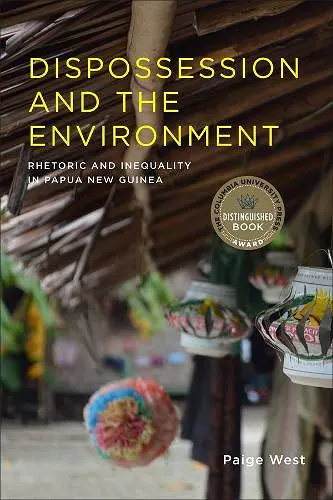Dispossession and the Environment
Rhetoric and Inequality in Papua New Guinea
Format:Hardback
Publisher:Columbia University Press
Published:28th Oct '16
Currently unavailable, and unfortunately no date known when it will be back

When journalists, developers, surf tourists, and conservation NGOs cast Papua New Guineans as living in a prior nature and prior culture, they devalue their knowledge and practice, facilitating their dispossession. Paige West's searing study reveals how a range of actors produce and reinforce inequalities in today's globalized world. She shows how racist rhetorics of representation underlie all uneven patterns of development and seeks a more robust understanding of the ideological work that capital requires for constant regeneration.
This is a brilliant work with theoretical force and wide-ranging epistemological and ethical implications. Rigorously researched and historically grounded, West documents how representational strategies - discursive, semiotic, and visual - in relation to Papua New Guinea underpin the enduring boundary between the nature/culture divide, which produces destructive material effects while entrenching white supremacy and capitalism in the globalized world of the twenty-first century. Rich, lucid, and incisive, Dispossession and the Environment is a must-read for scholars in anthropology, environmental studies, Pacific studies, and beyond. -- J. Kehaulani Kauanui, professor of anthropology and American studies, Wesleyan University Provocative and absorbing, Dispossession and the Environment clarifies the roles that ideologies of 'nature' and 'culture' play in the production of global inequalities. West demonstrates how indigenous philosophy and political ecology can offer new grounds for theorizing worlds remade by dispossession. A much-needed intervention in current debates over ontology and epistemology, this is decolonial anthropology at its best. -- Ty P. Kawika Tengan, author of Native Men Remade: Gender and Nation in Contemporary Hawai'i How do we ensure that anthropology does not set the stage for dispossession? This brilliant, powerful collection of essays by Paige West demonstrates the profoundly material effects of disabling colonial and anthropological representations of Melanesia. Papua New Guinean lives and environments matter, and hardly just for the benefit of capitalists, tourists, conservationists, and social scientists. -- Katerina Teaiwa, author of Consuming Ocean Island: Stories of People and Phosphate from Banaba In this intellectually groundbreaking study of uneven development, Paige West demonstrates how non-material representations of people and place in Papua New Guinea have profound material consequences. Her masterful analysis examines accumulation by dispossession through representational strategies that allow surfers, development experts, and other expatriates to dispossess Papua New Guineans of both their culture and their environment. A unique and powerful contribution to political ecology and environmental studies. -- Jerry Jacka, author of Alchemy in the Rain Forest: Politics, Ecology, and Resilience in a New Guinea Mining Area In this wide-ranging, passionately argued and beautifully written book, West examines the discursive, semiotic and visual strategies that work to dispossess Papua New Guineans of their land, livelihoods and sovereignty. Through lively case studies, she demonstrates not only the depth of ethnographic insight that only results from long-term engagement with communities, but also makes important connections between diverse sets of theory. This book is an important reminder of what anthropology can, and should, be. -- Joshua A. Bell, curator of globalization, National Museum of Natural History, Smithsonian Institution Drawing from the author's two decades of research experience in Papua New Guinea, this engaging, lively, and lucid manuscript discusses how structural inequalities are produced, lived, and reinforced in today's globalized world. -- Molly Doane, author of Stealing Shining Rivers: Agrarian Conflict, Market Logic, and Conservation in a Mexican Forest
- Winner of Columbia University Press Distinguished Book Award 2017
ISBN: 9780231178785
Dimensions: unknown
Weight: unknown
216 pages